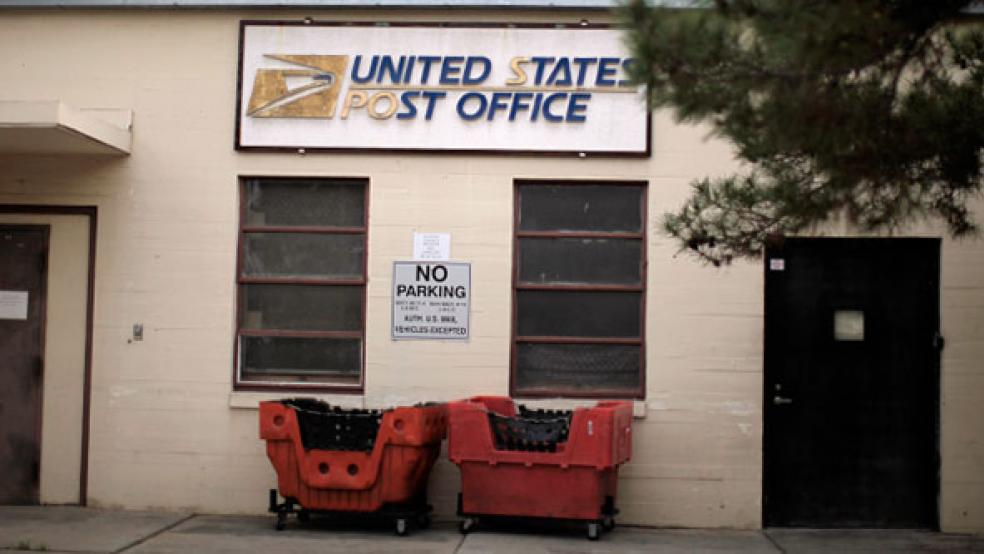Six year ago, the U.S. Postal Service rode high on a tidal wave of mailings touting local real estate and teaser-rate mortgages. The self-funded system declared a $1 billion profit in 2006 – a rarity during the USPS’s four decades of quasi-independence from the federal treasury.
Things were looking so good that Congress in late 2006 passed a “reform” law requiring the USPS to pre-fund its retirees’ health care benefits to the tune of $5.5 billion a year for 10 years. While that served a desire to make the federal deficit look smaller, pre-funding retiree health benefits was unheard of in the private sector. Yet the Post Office and its four unions went along since they had negotiated a long-term contract that would shrink its labor force through attrition as the Internet gradually ate into its first class mail and advertising.
Things didn’t work out exactly as planned. The Great Recession hammered every class of business that uses the mail. First class mail, package deliveries, magazine and catalogue shipments plunged. Revenue fell from a peak of $75 billion in 2007 to $66 billion last year when the USPS lost $5 billion. To cope, it encouraged employee retirements to shrink employment by nearly 15 percent, winding up with 550,000 workers at the end of last year.
But it wasn’t enough, especially with the law requiring pre-funding of retiree benefits still on the books. This week the USPS defaulted on its fiscal 2012 payment, which was due last October and had been postponed for 10 months. It will also default on its next payment due on September 30 unless Congress acts.
The likelihood that Congress will help the Post Office grows dimmer every day. The Senate passed a bi-partisan reform bill last April by a 63-37 margin. Its chief sponsors were Joe Lieberman, I-Conn., Tom Carper, D-Del., Scott Brown, R-Mass., and Susan Collins, R-Maine.
In addition to waiving the pre-funding requirement, it expanded the Postal Service’s authority to streamline its operations. That could include elimination of Saturday delivery, but only after two years. The bill also expands its shipping authority to include alcoholic beverages so it can compete with FedEx and UPS in that category while allowing its 33,000 retail outlets across the country to sell non-postal products.
The Republican-controlled House, however, can’t muster the votes to pass the legislation introduced by Rep. Darrell Issa, R-Cal., chairman of the Oversight and Government Reform Committee. The legislation would only waive the $5.5 billion payment for one year and requires full repayment in 2015 and 2016. In addition, if the losses continue, the bill creates a new financial control authority that can step in and void union contracts at the Postal Service, which currently have no-layoff clauses.
“The default by the Postal Service on its obligation to its own employees and retirees follows decades of mismanagement, and a willful blindness to fundamental changes in America’s use of mail,” said Issa in a prepared statement. “The Postal Service continues to fail to do all it can under current law to cut costs.”
High on the Republican leader’s agenda is driving down the wages and benefits of postal employees. “Postal workers get $45 an hour in wages and benefits,” said Ali Ahmad, a spokesman for Issa. “That’s very high for retail jobs.”
Officials who regulate the postal service counter that average postal worker salaries are about $45,000 a year. “Their salaries are not that much different from comparable workers,” said Ruth Goldway, chairman of the Postal Regulatory Commission, which oversees the operations of the USPS. “The Congressmen who support federal employees see it as a source of good middle-class jobs.”
The breakdown in the House, some observers say, has to do with the streamlining aspects of Issa’s bill, which would create a commission-style process for closing post offices similar to the base-closing commission that downsized the military’s footprint in the U.S. Rural representatives from both political parties fear the bill would lead to thousands of post offices being closed in their sections of the country since an estimated 3,000 post offices are money-losers for the USPS because of the low volumes.
Opposition to Issa’s bill has also come from second-class mailers, who rely on subsidized rates to deliver magazines and catalogues. The two categories accounted for about $1.5 billion of the USPS’s losses last year, according to Goldway. Shutting down service in rural areas would also be a major blow to carriers like FedEx and UPS, who subcontract with the USPS to deliver packages in out-of-the-way places.
“It was usually the rural senators and congressmen from both parties who worked together because they saw the postal service as essential infrastructure in their communities,” said Goldway, whose commission doesn’t endorse legislation. “This year, on the Senate side, rural Senators from both parties and the Democrats created a bill that would preserve as much of the postal service as they can. The Issa bill wants a serious restructuring and it can’t move.”





